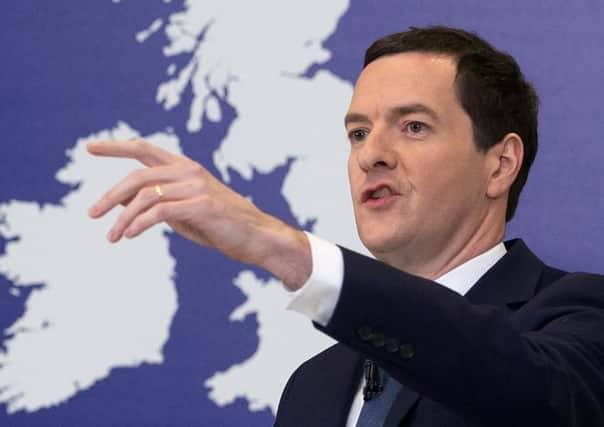George Osborne: Brexit would cost UK public services £36bn


The Chancellor warned that British families would pay a “heavy economic price” if the country votes to break from Brussels on 23 June, with the UK left permanently poorer.
The 200-page analysis produced by officials in Mr Osborne’s department was mocked by Brexit campaigners and branded “dodgy”, but the Chancellor insisted it was a “serious and sober analysis”.
Advertisement
Hide AdAdvertisement
Hide AdMr Osborne also faced questions over the assumption used in the document that net migration would fall to 185,000 a year from 2021 onwards – far in excess of the government’s goal of reducing it to the “tens of thousands”– with Leave supporters arguing that the Treasury had failed to take into account the costs of coping with an ever-growing population.
The Treasury analysis examined three potential options for the UK if it left the EU - the status currently enjoyed by Norway, which makes payments to the EU and accepts free movement in return for access to the single market, a bilateral free trade deal of the kind obtained by Canada, or a relationship under the rules of the World Trade Organisation.
The Chancellor focused his assessment on the Canada-style model, which has previously been championed by Boris Johnson.
Under the terms of a Canadian-style bilateral trade deal with Brussels, the economy would be 6.2 per cent smaller by 2030, the equivalent of £4,300 per household, the analysis suggested.
Mr Osborne said: “Under any alternative, we’d trade less, do less business and receive less investment.
“And the price would be paid by British families. Wages would be lower and prices would be higher.”
Mr Osborne rejected the claims of Leave campaigners that the country would benefit from the savings made by not contributing to Brussels’ coffers.
Speaking in Bristol he said: “Don’t believe the flimsy claim that at least we would get some money back by not paying our 1p on every £1 we raise in taxes to the European budget.
Advertisement
Hide AdAdvertisement
Hide Ad“We’d lose tens of billions of pounds in money for our public services, because our economy would be smaller and our families poorer.
“The most likely bill our public services would pay for leaving the EU is £36bn.
“That’s the equivalent of 8p on the basic rate of income tax.”
The Treasury document suggests that the Norway-style approach would see GDP fall by a central estimate of 3.8% in 2015 terms, the equivalent of £2,600 per household.
If there was no deal with the EU, and the UK fell back on WTO rules, the economy would suffer by between 5.4% and 9.5%, with a central estimate of a 7.5% fall - hitting each household by £5,200.
The analysis suggests that Norwegian-style European Economic Area membership would result in £20 billion lower public sector net receipts, the Canadian approach would leave the public sector £36bn worse off and the WTO route could mean £45bn less for services.
In an apparent effort to demonstrate the academic rigour behind its calculations, the Treasury attached a lengthy technical explanation to the 200-page report, setting out how it arrived at its figures.
The annex was peppered with algebraic equations, one of which – a “gravity model” examining examine the impact of EU membership on inflows of foreign direct investment – sparked humour on social media with one Twitter user saying it looked like “the key to the Philosopher’s stone”.